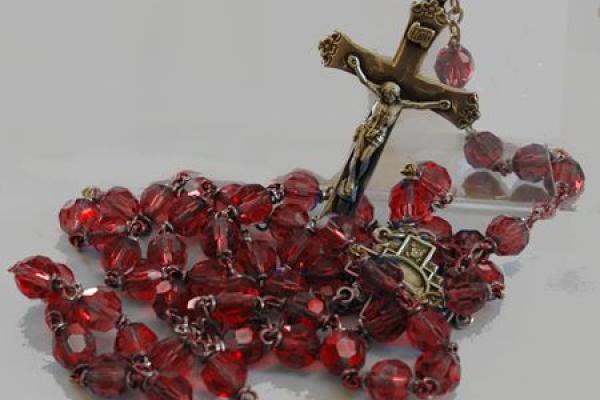
In 1935, St. Faustina received a vision of an angel sent by God to chastise a certain city. She began to pray for mercy, but her prayers were powerless. Suddenly she saw the Holy Trinity and felt the power of Jesus' grace within her. At the same time she found herself pleading with God for mercy with words she heard interiorly:
Eternal Father, I offer You the Body and Blood, Soul and Divinity of Your dearly beloved Son, Our Lord Jesus Christ, in atonement for our sins and those of the whole world; for the sake of His sorrowful Passion, have mercy on us (Diary, 475).
As she continued saying this inspired prayer, the angel became helpless and could not carry out the deserved punishment (see 474, 475).
The next day, as she was entering the chapel, she again heard this interior voice, instructing her how to recite the prayer that our Lord later called "the Chaplet." This time, after "have mercy on us" were added the words "and on the whole world" (476). From then on, she recited this form of prayer almost constantly, offering it especially for the dying.
In subsequent revelations, the Lord made it clear that the Chaplet was not just for her, but for the whole world. He also attached extraordinary promises to its recitation.
Encourage souls to say the Chaplet which I have given you (1541).
Whoever will recite it will receive great mercy at the hour of death (687).
When they say this chaplet in the presence of the dying, I will stand between My Father and the dying person, not as the just Judge but as the Merciful Savior (1541).
Priests will recommend it to sinners as their last hope of salvation. Even if there were a sinner most hardened, if he were to recite this chaplet only once, he would receive grace from My infinite mercy (687).
I desire to grant unimaginable graces to those souls who trust in My mercy (687).
Through the Chaplet you will obtain everything, if what you ask for is compatible with My will (1731).
Prayed on ordinary rosary beads, the Chaplet of Divine Mercy is an intercessory prayer that extends the offering of the Eucharist, so it is especially appropriate to use it after having received Holy Communion at Holy Mass. It may be said at any time, but our Lord specifically told St. Faustina to recite it during the nine days before the Feast of Mercy (the first Sunday after Easter). He then added:
By this Novena, [of Chaplets] I will grant every possible grace to souls (796).
It is likewise appropriate to pray the Chaplet during the "Hour of Great Mercy" - three o'clock each afternoon (recalling the time of Christ's death on the cross). In His revelations to St. Faustina, Our Lord asked for a special remembrance of His Passion at that hour.
The Chaplet can also be sung using various melodies.
How to Recite the Chaplet
(On ordinary rosary beads) (Diary, 476)
The Our Father
Our Father, Who art in heaven, hallowed be Thy name; Thy kingdom come; Thy will be done on earth as it is in heaven. Give us this day our daily bread; and forgive us our trespasses as we forgive those who trespass against us; and lead us not into temptation, but deliver us from evil. Amen.
The Hail Mary
Hail Mary, full of grace. The Lord is with you. Blessed are you among women, and blessed is the fruit of your womb, Jesus. Holy Mary, Mother of God, pray for us sinners, now and at the hour of our death. Amen.
The Apostles' Creed
(Text from official approved translation. See Holy Saturday Liturgy in the Roman Missal.)
I believe in God, the Father almighty, creator of heaven and earth.
I believe in Jesus Christ, His only Son, our Lord. He was conceived by the power of the Holy Spirit, and born of the Virgin Mary. He suffered under Pontius Pilate, was crucified, died, and was buried. He descended to the dead. On the third day He rose again. He ascended into heaven, and is seated at the right hand of the Father. He will come again to judge the living and the dead.
I believe in the Holy Spirit, the holy catholic Church, the communion of saints, the forgiveness of sins, the resurrection of the body, and the life everlasting. Amen.
Each Decade:
Eternal Father,
I offer You
the Body and Blood,
Soul and Divinity
of Your dearly beloved Son,
Our Lord Jesus Christ,
in atonement for our sins
and those of the whole world.
On the 10 Small Beads of Each Decade:
For the sake of His sorrowful Passion,
have mercy on us
and on the whole world.
Concluding Doxology:
(after five decades)
Holy God,
Holy Mighty One,
Holy Immortal One,
have mercy on us
and on the whole world.
(Three times)
Optional Concluding Prayer
Eternal God, in whom mercy is endless and the treasury of compassion inexhaustible, look kindly upon us and increase Your mercy in us, that in difficult moments we might not despair nor become despondent, but with great confidence submit ourselves to Your holy will, which is Love and Mercy itself (950).

















